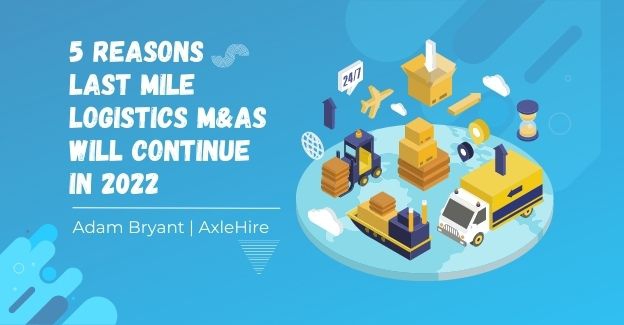As supply chain disruptions continue to mount, logistics companies are experiencing a boom in mergers and acquisitions to improve last mile delivery capabilities, says Adam Bryant, CEO of AxleHire. He gives five reasons why he expects the mergers and acquisitions trend to continue amid booming consumerism.
Last year saw a flurry of merger and acquisition activity in the logistics industry. In the last mile carrier sector, UPS acquired point-to-point carrier Roadie in September. A month later, regional last-mile carrier Lasership acquired another regional carrier, OnTrac, for a reported $1.3 billion.
There is a lot of speculation about whether these are one-offs or more of a trend that will carry over into 2022 and beyond. We lean toward the latter and think there are at least five good reasons why you will see M&A activity continue in the last mile carrier space in 2022.
1 – Basic Economics
We’ve seen double-digit growth in ecommerce over the past few years, with projections of more double-digit growth to continue for the foreseeable future. Someone must deliver all those packages, and the logistics sector is currently projecting solid growth for at least the next five years. The economy is flush with investors looking for opportunities to throw money at hot properties. It’s a match made in heaven.
M&A activity is a standard feature of rapidly growing industries. Existing carriers will seize opportunities to grow revenue, add market share and enter new markets by acquisition. VC investors will see opportunities to multiply their existing positions in last mile startups with strategic investment in complementary technologies.
This will be good news for shippers, as industry competition will be fierce and at least some of the M&A activity will likely result in innovations that improve service levels and reduce costs.
2 – Coverage Consolidation and the Search for the Holy Grail
Judging from much of the press coverage of our industry, the holy grail of logistics appears to be the creation of a new national carrier to compete with UPS and Fedex (and USPS).
With its acquisition of OnTrac, the Lasership/OnTrac network covers roughly 75% of the U.S. population, with plans to add coverage in more major metro areas this year either through additional acquisitions or greenfield expansion. Other carriers will follow suit, with a primary focus on expansion in major metro areas, but it’s unlikely that any carrier will be able to muster the resources to match the coverage of the big three. And why would they want to?
Does a carrier need to deliver to Fargo, North Dakota, to be considered a national carrier? UPS, Fedex and USPS all deliver to Fargo. No offense to Bill Macy and the Coen Brothers, but they can have Fargo. The next “national” last-mile carrier probably won’t deliver there and hardly anyone will notice. The cost to expand to cover small markets will be too high and the ROI isn’t there.
We think broader coverage is good for shippers, but the real holy grail for last mile carriers is density (combining packages from more shippers into shorter routes) in those urban markets where almost 90% of U.S. consumers live. Denser routes reduce costs for shippers and carriers and tend to be more profitable for gig drivers. We expect to see M&A activity this year – some of which might fly under the radar – that will allow urban carriers to increase delivery density and bring new, more sustainable technologies to urban last mile delivery.
3 – Technology Acquisition
From 2017 to 2020, Roadie achieved revenue growth of 2,157%. No, that’s not a typo, but it’s also not the primary reason UPS went forward with the acquisition. According to UPS, “Roadie’s leading technology, combined with UPS’s portfolio, will open doors for new growth opportunities. Roadie’s technology platform also will provide opportunities to improve existing, and potentially add additional, UPS small package capabilities. The Roadie technology platform…”
How many times does the word technology appear in that release? It can take years to build new technology and the risk of failure is high. If you have cash in hand, the faster and safer play will be to acquire technology.
One of the characteristics of the current crop of last mile startups is that they are technology savvy – using technology to attack the challenges of last mile delivery and then building tech-driven processes to optimize delivery. Legacy carriers have tended to follow a different approach, applying technology to automate existing manual processes.
As legacy carriers hit capacity limits, we expect to see a pivot in how they view technology, and we expect to see more transactions where tech savvy startups are acquired by more established players, primarily for their technology.
4 – Talent Acquisition
If a carrier wants to enter a new metro market, it has two options for acquiring talent. The first is to rent some warehouse space and then post dozens of job openings for people to manage, sort, load and deliver packages. The second is to acquire or partner with a local or regional carrier that already has the infrastructure and talent in place. We see both scenarios currently happening in the industry.
The driver shortage is a real thing, but there is also a shortage of trained logistics people in general. That shortage is likely to become more acute as we continue to experience annual double-digit growth in e-commerce. As discussed above, coverage consolidation in urban markets will help – and higher driver profitability may attract more drivers to the industry – but there is also a need for some more creative solutions in this area.
We’re not sure yet what the answer is, but we do know this problem won’t solve itself. The industry is searching for long-term solutions. In the interim, one of the ways we will see carriers acquire new talent is to acquire other carriers’ existing talent through M&A activity.
5 – Self-Preservation
One of the more interesting by-products of the pandemic and resulting supply chain disruptions has been the growing tendency of large retailers in the logistics space to grab more control of their supply chains. In recent months, American Eagle Outfitters acquired Air Terra and Quiet Logistics and Ashley Furniture acquired Wilson Logistics.
These are moves aimed primarily at hardening supply chains, but it is probably just a matter of time before we see large retailers dip their toes into the last mile delivery waters. Whether this will come through M&A or through more limited partnerships between shippers and carriers is probably a topic for a longer conversation than we have time for here.
We believe the flurry of M&A activity in the last mile logistics industry in 2021 is the precursor to a wave of activity that will carry through 2022 and beyond. Shippers will benefit from better service levels and cost containment. Carriers will see influxes of cash that will allow for new and creative service opportunities. We’re looking forward to riding that wave.









